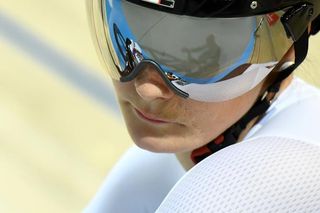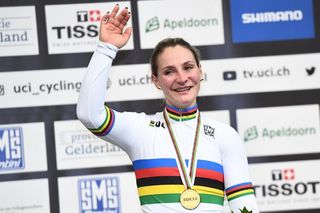Kristina Vogel: Sport will always be a part of me
World champion speaks about challenges, inspiration and her future with paralysis






The life of two-time Olympic champion and 11-time world champion Kristina Vogel changed irrevocably in June 2018 when she suffered spinal injuries in a crash while training on the Cottbus velodrome in Germany. It would be months before the cycling world would learn the extent of her injuries when, in September, Vogel went public with her new reality: she was paralysed from the chest down.
Milton Track World Cup: Final day Keirin victory for Vogel
Olympic champion Vogel seriously injured in track crash
Kristina Vogel left paralysed after horror training crash
Kristina Vogel will return to velodrome for first time since accident
Vogel receives 'thunderous ovation' on emotional return to velodrome
Three months later, in what was both a testament to her resilience and a need to be back among her track community, Vogel attended the Berlin World Cup, where she received a thunderous ovation from more than 2,000 athletes and fans who were in attendance.
Vogel was back in the velodrome, once again, at the recent Six Day Berlin, held from January 24-29 at the Velodrom Berlin. A year ago, she had won the women’s sprint competition at the event in convincing fashion. This time, she was firing the starting gun.
Cyclingnews met with Vogel to talk about her new challenges, sport, politics and what it means to be an inspiration.
Vogel was training on a concrete track in Cottbus with Pauline Grabosch when she collided with another rider at 60 kph. She was airlifted to a hospital and placed in a medically induced coma and underwent several operations. However, during the accident, her spinal cord was severed at the seventh thoracic vertebra. She has full control of her arms, hands, and head, but she has been forced to come to terms with life as a person with paraplegia.
Vogel went public with her condition in an interview with German newspaper Der Spiegel in September. She was released from hospital in December, but she still faces a long rehabilitation. She acknowledged that adapting to life without the use of her legs is about more than just physical therapy and training.
There is also the matter of her surroundings and accessibility in her everyday life. The house that Vogel and her partner live in, for example, needs to undergo renovations to be fully wheelchair-adapted. Vogel’s teammate and friend Maximilian Levy appealed for donations early on after her crash – an appeal that is still ongoing.
Get The Leadout Newsletter
The latest race content, interviews, features, reviews and expert buying guides, direct to your inbox!
"There are many things that have to be rebuilt," Vogel told Cyclingnews. "We had thought about accessibility when building the house, but only in terms of growing older. We had not considered that one of us might be in a wheelchair one day.
"Other than that, the small details are important, too – often things you don't think about as an able-bodied person; I need several wheelchairs for various purposes, and it would be great to have a handbike, and these things simply cost more than a pair of sneakers."
Vogel makes it clear that she will not rush into the new changes in her life. There has been speculation that, given her achievements as a track cyclist, she may turn to competitive para-cycling. Even though she has published moving images and video footage of herself learning new activities such as archery, basketball and kayaking, she dismissed the notion that she might turn to competitive sports again, or at least not any time soon, as she adapts to life in a wheelchair.
"I will need two to four years to really get acquainted with my new life situation," Vogel said. "Eventually, I want to find something that I enjoy. If that turns out to be a sport, that's great, but it could just as soon be something else. In any case, sports will always be a part of me and my life."
Vogel, 29, had spent her career competing at the highest level, beginning as a junior athlete when she was just 12 years old. Her focus now, however, is to enjoy a normal lifestyle with less self-discipline.
"It was fine for me to forgo certain things when I was an athlete," Vogel said. "But now I can have a beer just like that, and that is very nice. I am not an athlete anymore, and now I want to take the chance to live a normal life."

Making a difference
Vogel may have turned her attention away from sports for the time being, but she has refocused it on building better infrastructure for people with disabilities. She said that, given her new perspective from a wheelchair, she had noticed the deficits in inclusion and accessibility that still exist in society at large.
To make a difference in her community, Vogel will run for city council in her hometown of Erfurt for centre-right political party, the Christian Democratic Union (CDU). She is virtually sure of being elected this May, courtesy of being placed on the second spot on the party list. Once elected, Vogel said that she wants to work to improve sports facilities and accessibility for people with disabilities.
"I love my hometown and want to give something back," Vogel said. "And I think that as a sportswoman, a wheelchair user and a police officer, I can offer a range of perspectives on how to improve the city.
"One focus of mine will be to urge everyone to consider accessibility from the very start of, for example, a building project. if you do that from the start, it doesn’t cost much extra to, for example, install wider doors or shower cubicles, but it makes a difference."
On top of her work in politics, Vogel wants to try to use her status as a public figure to encourage other people with disabilities. She acknowledged, however, that her status as a public figure has not always been easy, but she believes that being open about the challenges she faces with her disability might help others who face similar obstacles.
"It can be hard," Vogel said. "It can feel almost like an obligation to share my life with the public, and I'm judged harshly no matter what I do. But I also want to use this publicity. Some disabled people are reclusive and anxious about being in the public sphere; I want to give them the courage to go out and live their lives freely."
At the Track World Cup in Berlin in December, Vogel was awarded the accolade of 'Cyclist of the Year' by the German Federation. In addition, Thüringen’s Minister of Sport, Helmut Holter, presented Vogel with an award for being a role model and for her services to her sport. Vogel also placed second in Germany’s Sportswoman of the Year, voted by the country’s sports media. Tennis champion Angelique Kerber won the category and paid tribute to Vogel in her acceptance speech.
At the Six Day Berlin, Vogel was one of the patrons of the U15/U17 Girls’ Cup, and she gave out the trophies following the event. She enjoyed watching the young girls who raced without pressure to perform and was happy to be part of the podium ceremony.
Using an anecdote about her youth, however, Vogel cautioned that famous athletes shouldn't be built up into more than they are – human.
"When I started in track cycling, I looked up to the stars of the day myself, almost thinking of them as larger-than-life figures," Vogel said. "Later, when I trained with them, they turned out to be totally regular, down-to-earth people.
"These girls are carefree and race for fun, and they do it because they enjoy it. I'm happy to support these young riders, and if it gives them a motivation boost to meet me, I'm all for it."

Cyclingnews is proud to introduce the first episode of our Cyclingnews Podcast Women's Edition, brought to you by Sportful, Pinarello and Floyd's of Leadville.


Thank you for reading 5 articles in the past 30 days*
Join now for unlimited access
Enjoy your first month for just £1 / $1 / €1
*Read any 5 articles for free in each 30-day period, this automatically resets
After your trial you will be billed £4.99 $7.99 €5.99 per month, cancel anytime. Or sign up for one year for just £49 $79 €59

Join now for unlimited access
Try your first month for just £1 / $1 / €1
Lukas Knöfler started working in cycling communications in 2013 and has seen the inside of the scene from many angles. Having worked as press officer for teams and races and written for several online and print publications, he has been Cyclingnews’ Women’s WorldTour correspondent since 2018.